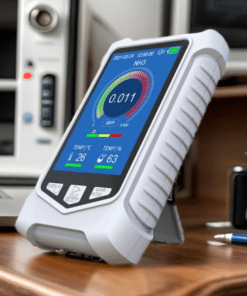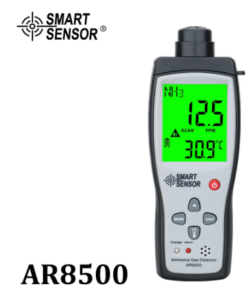NH3 detector
An NH3 detector is a device designed to detect and measure the concentration of ammonia gas (NH3) in the air. Ammonia is a colorless gas with a pungent odor that can be harmful to human health in high concentrations.
Why is NH3 detection important?
- Health risks: Ammonia gas can irritate the eyes, nose, and throat, and can cause respiratory problems, particularly in individuals with asthma or other respiratory conditions. In severe cases, exposure to high concentrations of ammonia can be fatal.
- Environmental impact: Ammonia emissions contribute to air pollution and can damage ecosystems.
- Industrial applications: Ammonia is widely used in various industries, including agriculture, refrigeration, and chemical production. Monitoring ammonia levels is crucial for ensuring safety and efficiency in these settings.
How does an NH3 detector work?
NH3 detectors typically use sensors that react to ammonia gas. The sensor converts the chemical reaction into an electrical signal, which is then processed to determine the concentration of ammonia in the air. Different types of sensors, such as electrochemical sensors and semiconductor sensors, are used in NH3 detectors.
Applications of NH3 detectors:
- Industrial settings: Monitoring ammonia levels in industrial facilities to ensure worker safety and prevent accidents.
- Agricultural settings: Detecting ammonia leaks from fertilizer storage tanks or manure storage facilities.
- Environmental monitoring: Measuring ammonia emissions from industrial sources and agricultural activities.
- Residential settings: Detecting ammonia leaks from household appliances or cleaning products.
By using NH3 detectors, individuals and organizations can take steps to protect human health and the environment from the harmful effects of ammonia gas.
NH3 detector


